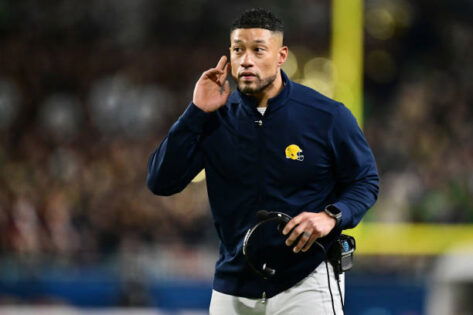The 2025 collegiate track and field season reached a boiling point this past weekend as the Big 12 and SEC Outdoor Championships wrapped up in explosive fashion. At Rock Chalk Park in Kansas, Big 12 athletes put on a three-day showcase of grit and speed, while over in Lexington, Kentucky, the SEC delivered a thunderous finale of its own. Unsurprisingly, Arkansas reigned supreme once again, collecting their 24th SEC men’s outdoor title with an overwhelming 98.5-point total.
But amid the familiar dominance of the Razorbacks, fresh headlines emerged like Jordan Anthony’s jaw-dropping sprint that now ranks as the third-fastest 100m of the entire 2025 season across both college and pro levels. With records shattered and top teams flexing their depth, attention quickly shifted beyond the medals. While fans were still buzzing about breakout performances, one NCAA track and field coach of RBC Athletics decided to stir the pot. Taking to social media shortly after the conference weekend wrapped, the unnamed coach dropped a cryptic message that’s now got the entire track community speculating.
Coach Rashad Cannon, Head Men’s and Women’s Track & Field/Cross Country Coach for @GoRBCStatesmen, posted a message on X (formerly Twitter), “Some of your standards aren’t aligned with the results from them conference meets .” A single emoji, a subtle jab, and a statement that immediately sparked discussion. But Cannon’s timing wasn’t random. It came right as the dust settled from the high-profile SEC and Big 12 championships, and just as Richard Bland College athletes were making their mark on the national stage. While social media decoded his intent, his athletes were letting their performances do the talking.
Some of your standards aren’t aligned with the results from them conference meets
— Coach Cannon (@CoachCannon15) May 18, 2025
One of the biggest standouts was freshman Michaelyn Fisher, who soared to a fourth-place finish in the women’s long jump at the 2025 NJCAA Outdoor National Championships in Hutchinson, Kansas, leaping 18 feet 6 inches. That mark didn’t just earn her a spot on the podium. It crowned her an NJCAA All-American. “Way to go Michaelyn!!” the school wrote, celebrating the achievement. On the men’s side, Zion Richardson-Keys also landed in the national rankings, finishing 15th overall with a jump of 22’2.25″. The performances proved that despite operating outside the Power Five spotlight, Richard Bland is not just participating. They’re competing.
Cannon’s comment may have seemed like a passive observation, but in context, it hit much deeper. Across the NCAA, athletes like Jordan Anthony and Kayinsola Ajayi have stolen headlines this spring. Anthony with his blistering 9.95s 100m dash at the SEC Championships, and Ajayi, the 20-year-old Nigerian, storming to a wind-legal 9.96s in Gainesville. Both performances lit up the leaderboard, but Cannon’s point was clear. Accolades at big-name schools don’t always match expectations and the so-called “smaller” programs are quietly stacking wins.
Overcrowded tracks and the uncertain future of NCAA fairness
The Arkansas Razorbacks lived up to expectations at the 2025 SEC Outdoor Track & Field Championships, clinching their 24th men’s outdoor title and an impressive fifth consecutive win showing at the Shively Track & Field Stadium in Lexington on May 17. But amid their dominance, it was the men’s 5,000-meter final that sparked headlines and concern. Just seconds into the race, chaos broke loose as a massive pileup unfolded, catching several runners off guard and bringing the field to a near standstill.
In the aftermath, commentary flooded in most notably from track and field analyst Charles Fogelman, who posted, “It appears that 51 people started this race. This is maybe a side effect of new mega conferences: the SEC has 16 schools; the Big Ten (18 schools) had 44 men start their championship 5000.” His point hit home, larger conference sizes are increasing race fields to unsustainable levels, raising the risk of exactly the kind of incident seen in Lexington. The Big Ten, for instance, strategically reduced their number of actual race participants to avoid such chaos, despite having even more schools.
This wave of logistical challenges comes at a time when college athletics are already navigating stormy waters. With impending policy changes, schools will soon be responsible for directly paying athletes under a $20.5 million salary cap. However, it’s not mandatory to spend the full amount and it’s expected that schools will prioritize high-revenue sports. Meanwhile, back payments for the 88,000 former Division I athletes currently filing claims won’t be evenly distributed, as payout depends on the sport and power conference affiliation. The 5,000m disaster may have played out over minutes but the institutional impacts could ripple across seasons.
The post NCAA Track and Field Coach Sends Bold Cryptic Message After Outdoor Conference Championships appeared first on EssentiallySports.



